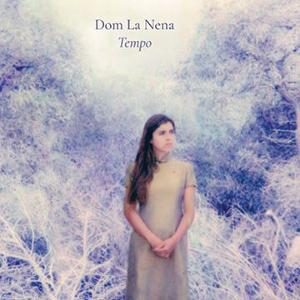
The multi-talented singer, songwriter, producer, and cellist, Dom La Nena's new album, Tempo, is about time. With the new album the Brazilian-born, Paris-based artist created a series of small, crystalline moments - sometimes sunny, often dreamy, and occasionally laced with that beautiful nostalgia the Brazilians call saudade. The new album out now on Six Degrees Records.
Singles "Quién Podrá Saberlo" ft. Julieta Venegas,
"Todo Tiene Su Fin," which first debuted with Complex and the multi-lingual lead single
'Oiseau Sauvage,' out now, all center around the album's core theme of time. The new album, Tempo is La Nena's third full-length release, after 2013's critically acclaimed Ela, and her internationally-flavored indie-folk collection called Soyo in 2015. Dom is also half of the duo called Birds On A Wire with Rosemary Standley (lead vocalist of the band Moriarty). Together, they have built a songbook from the baroque Henry Purcell to Leonard Cohen, passing by Gilberto Gil, Tom Waits, and Violeta Parra. They have released two albums (Birds on a Wire - 2014- and Ramages -2020) that are very successful in France, where they've been touring for almost 10 years. Add to that her time spent playing with Jane Birkin, Jeanne Moreau, Marcelo Camelo (from Brazilian band Los Hermanos) or Piers Faccini, and you have an artist with an eclectic, multi-lingual style that's hard to define but easy to like.
With its blend of pop, world, and chamber music, you may hear Tempo as a response to, or a respite from, difficult times. And you wouldn't be wrong, although La Nena says that wasn't intentional. "Composing and writing are a mysterious and very unconscious process for me. Everything in my life is a source of inspiration and has had an influence on my music and lyrics. I've become a mother recently and it has raised a lot of questions about the value of time and life. Consequently, some of these questions are very present on the album: Birth, anticipation, aging, death" comments Dom La Nena.
Tempo may sound like a lush tapestry of synthesizers, strings, and percussion instruments but really the album is a remarkable display of Dom La Nena's arranging and orchestrating abilities. She created all the sounds on the album herself, using layers of her voice, her cello, and a few piano parts. Even the percussion sounds were made on the cello. "My intention on this album was to explore new ways to use my instrument, to change the original sound of the instrument and take it somewhere else," she says.
The album starts innocently enough, with the title track. "Tempo" acknowledges the cello's Baroque roots and pairs it with layers of Dom's vocals. "For the first time I had the desire to compose instrumental music. In the same way that I've tried to bring my cello far from his usual sonority, I also wanted to explore new musical genres."
Of course, there are lyrics on most of the songs, and in typical Dom La Nena fashion, those lyrics can be in Portuguese, Spanish, or French - or, as she points out, a mix of the three. "It is very difficult to explain because it's not something I control. The music makes the demand to match the sounds, the words, the specific language rhythms."
Julieta Venegas joins her on
"Quién Podrá Saberlo" with overlapping vocals, clapping, and dreamy cello arrangements to create a sonically stunning song. And by the time we get to the eerie, almost Near Eastern-sounding "Moreno," La Nena is creating drones, percussion and what sounds like mallet instruments from her cello and effects.
An album about time could be an impossible mission, but La Nena has written many of these songs about specific moments in time. She has long been a gifted producer and arranger, and in stripping back the instrumental textures on this album, she displays a sure hand in the control room. Despite the restricted sonic palette, La Nena creates a wide range of sounds: the jaunty "Oiseau Sauvage," with its lilting vocal line; the waltzing bowed and plucked cellos of "Valsa"; the heart of her daughter on "Esperando Alma" and "Teu Coração" and the up tempo but still relaxed mood of "Vejo Passar." Melting vocal harmonies color the song "Doux De Rever," a song about growing older. And the subtle interplay of pizzicato cello, cello-percussion, and piano supports Dom La Nena's multi-part vocals on the album's closer, "Milonga," which she describes as a song about "death and transition." And in an album that's all about moments in time, none of these moments overstays its welcome.
Tempo marks the return of a distinctive and exceptional musician. It's about time.
Order/Save Tempo:
https://domlanena.lnk.to/tempo
Comments
To post a comment, you must
register and
login.

![]()


